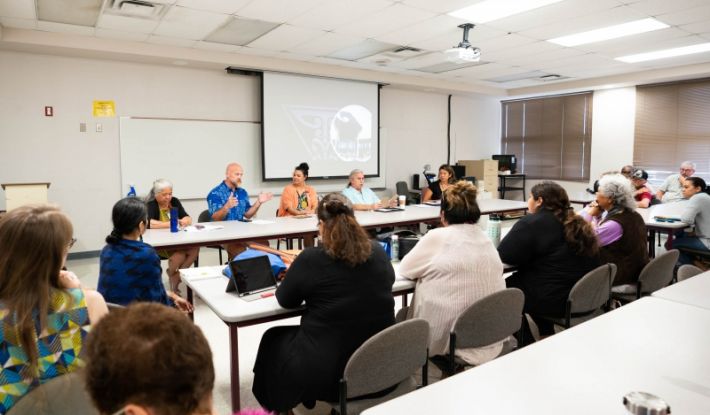More than 500 indigenous educators, scholars and cultural practitioners from around the world recently converged at University of Hawai‘i Maui College for the He Au Honua: Indigenous Research Conference. Attendees explored how native intelligence can address modern world issues and crafted solutions that will affect generations to come.
The conference was hosted by the Native Hawaiian Education Association (NHEA) in partnership with UH Maui College and Kamehameha Schools. Originating in Aotearoa, conference founders gifted the event to Hawai‘i in 2017 to signify the close ancestral ties between the Māori and Kānaka Maoli.
“Bringing together indigenous educators is very important to our organization, and we believe in collaborating and sharing ideas so those educators can take new concepts back to their own communities and places of learning to integrate,” said NHEA President Kulamanu Ishihara, who also serves as a counselor at UH Maui College. “Maui College is striving to be an innovative Hawaiian place of learning. Having young leaders take kuleana, and taking that to the next level for the next generation, it’s amazing.”
The conference theme – “I Mana ka Mauli, I Mauli ka Mana,” or, “Life is Divine Power, Divinely Powerful is Life” – encouraged attendees to explore the rich collection of ancestral and indigenous knowledge and research.
“He Au Honua closely aligns with Kamehameha Schools’ mission and Pauahi’s vision in uplifting Native Hawaiians through education and the sharing of knowledge,” said Kā‘eo Duarte, vice president of KS’ Community Engagement and Resources Group. “Having partners like UH Maui College and NHEA was critical in bringing these scholars together and creating a forum to share ‘ike as we collectively work to advance the well-being of all indigenous people and society as a whole.”
The three-day collaboration featured specific topics including revitalizing indigenous languages, Hawaiian drama and media, and navigating new models of indigenous health and well-being.
“KS’ sponsorship and coordination of He Au Honua is a demonstration of our commitment to quality culture-based learning and ʻike and creating opportunities for young Hawaiians to develop solutions for modern day issues utilizing their indigenous perspective,” said Dr. Jamee Mahealani Miller, KS regional director for Ko‘olau and Waialua and co-organizer of the conference. “We need to equip the rising generation of ʻōiwi leaders with the ʻike to lead our lāhui and world into the future, and KS is proud to be a part of He Au Honua as it shows the world that indigenous intelligence can offer world-class, data-based, culturally grounded solutions for modern issues.”
Gordon “Umi” Kai is a cultural practitioner and skilled craftsman who teaches through the construction of traditional Hawaiian weapons and implements. Kai attended the conference, and shared his approach to education, which in a “Western” sense is non-traditional, but reflects a traditional Native Hawaiian method of education.
“I have no professional degrees in teaching, but in traditional fashion, it’s your experiences that really measure how well you are as a teacher,” said Kai. “And, so far, I’ve been lucky enough to be classified as a ‘good teacher’ by organizations and individuals. My method of teaching involves making sure students observe what I’m doing first because observation is one of the key learning tools that Native Hawaiians always had. Without observing the sky and the sea and the land, they would have never been able to get here or survive in the islands. It’s not so much teaching per say, it’s a way of life.”
For more information and to learn about some of the featured speakers and workshops that were showcased at He Au Honua, visit heauhonua.com. For extended interviews with Ishihara and Kai, check out the latest episodes of Ka Piko Podcast.



TAGS
sp2020 goal 2,
partnering for success
CATEGORIES
Kaipuolono Article, Regions, Themes, Culture, Community, Newsroom, Department News, Features
Print with photos
Print text only










